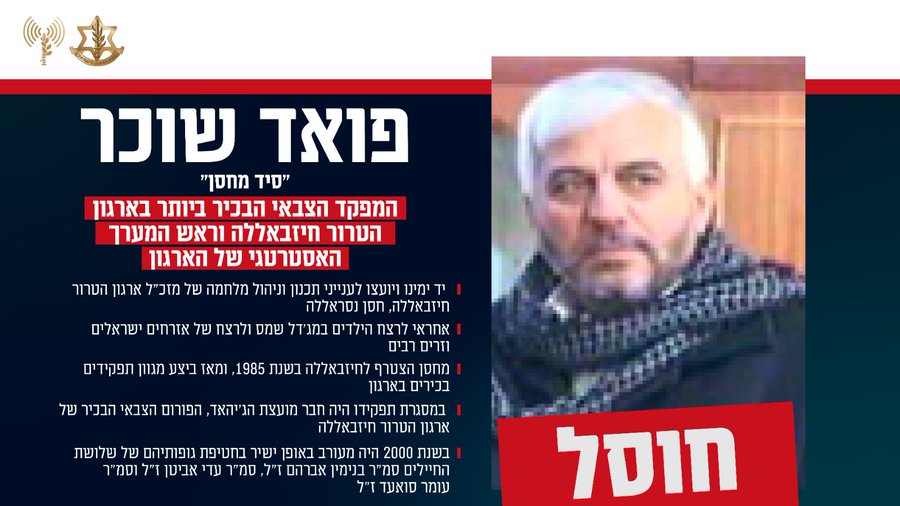Shouker was a significant figure in Hezbollah, serving as a top adviser to Nasrallah on war planning and management.
He played a key role in transforming Hezbollah from a small terrorist organization into a formidable military force, well-equipped with advanced weapons supplied by Iran.
His assassination is seen as a severe blow to both Hezbollah and Iran, particularly impacting their joint project on precision missiles, which pose a substantial threat to Israel.
The assassination was carried out by Israeli Air Force planes in the A-Dahiya neighborhood of Beirut.
According to political sources in Jerusalem, Israel notified the United States in advance of the planned operation.
Currently, there is no change in the IDF’s instructions to Israeli residents, but preparations are underway for a potential Hezbollah response.
In Israeli security circles, Shouker was referred to as Hezbollah’s “chief of staff,” holding a very senior position.
He was responsible for building up Hezbollah’s military power and was closely connected to the top leadership of Iran’s Quds Force and Revolutionary Guards.
His elimination sends a strong message to Iran and all parties within the resistance axis that Israel is capable of penetrating intelligence networks and conducting targeted killings at will.
This operation is part of Israel’s broader strategy against the Iranian axis of influence, following the assassination of Muhammad Def, the supreme commander of Hamas’ military wing in Gaza.
Despite this, the situation on Israel’s northern border remains tense, with many residents displaced.
The issue of returning these residents and removing Hezbollah forces from the border, as stated in UN Resolution 1701, remains unresolved.
How Will Hezbollah React to the Assassination of Fouad Shouker?
Hezbollah has not yet officially responded to Shouker’s assassination.
However, sources within the organization told the newspaper “A-Sharq Alawsat” that they see Israel’s actions as a breach of the established “rules of engagement.”
Israel has been clear through various media and diplomatic channels that it does not seek an all-out war with Hezbollah in Lebanon, and the military response was planned with this restraint in mind.
The massacre in Majdel Shams, likely an unintended act by Hezbollah, has become a turning point in the ongoing conflict, providing Israel with an opportunity to attempt to change the rules of engagement.
Despite Hezbollah’s denial of responsibility for the massacre, Israel feels it has clear legitimacy to establish new rules and potentially reach a ceasefire, detached from the situation in Gaza.
Hassan Nasrallah, guided by Tehran, understands the catastrophic consequences of an all-out war, particularly recalling the devastation of the 2006 Second Lebanon War.
Both Hezbollah and Iran are currently not interested in a full-scale war that could escalate into a regional conflict.
However, Nasrallah also needs to project strength to avoid appearing weak to his supporters and to deter further Israeli actions.
Nasrallah has managed to contain the anger of the Druze community in Lebanon, with leaders like Walid Jumblatt and Talal Arslan cooperating in the narrative that Israel was responsible for the massacre, a claim not believed by the Druze communities in Syria and Israel.
The recent Israeli military action is positioned not as revenge for the massacre in Majdel Shams but as a strategic move to deter Hezbollah from future attacks and to change the rules of engagement.
However, senior Israeli security officials express doubt about the likelihood of achieving a stable ceasefire.
In summary, Nasrallah’s response to Shouker’s assassination will be decisive in shaping the next phase of this conflict.
While Israel prepares for the worst-case scenario, there is hope that a measured response from Hezbollah will prevent further escalation.




